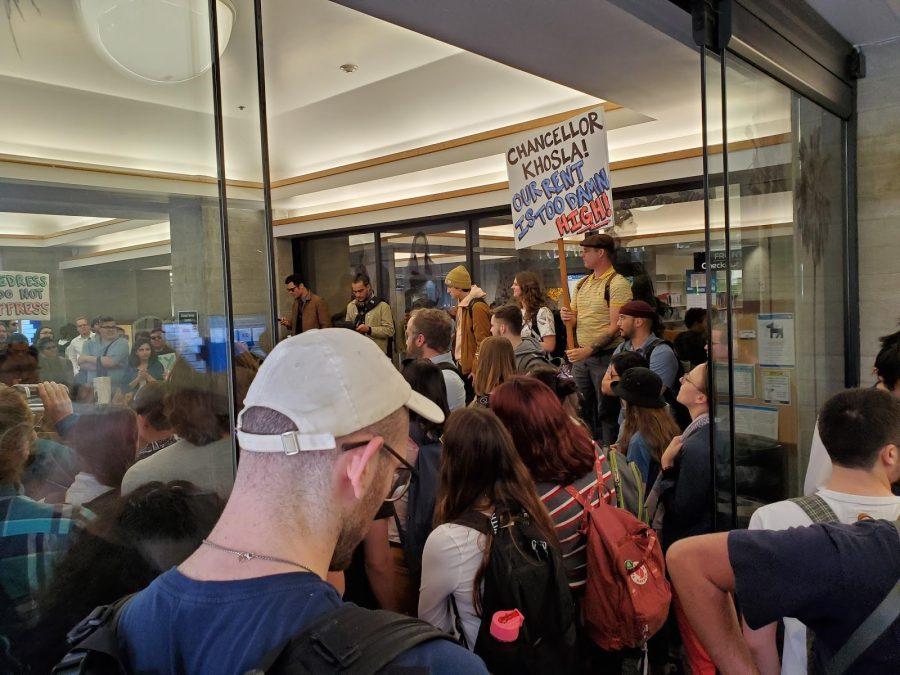This letter to the editor by Associate Professors Lilly Irani and Eric Hekler and Graduate students Davide Carpano and Eleanor Castracane addresses the #COLA4ALL movement under the context of the COVID-19 pandemic.
Across the University of California, some undergraduates are experiencing a more personal approach to getting feedback in their courses from an uncommon cause – a graduate student teaching assistant strike. At UC San Diego, 160 teaching assistants have joined the strike to gain costs of living adjustments to their salaries. They are withholding one of the key products they control — grades — from university administration. This week as computers across six — out of 10 total — UCs register undergraduate Winter quarter grades, for many classes student transcripts will remain blank. Organizers estimate that, across campuses, one thousand teaching assistants have joined this “digital picket line.”
“We care deeply about the power of education. Although the university isn’t supporting us as we need, we will continue to do everything we can to support our students,” explained UC San Diego Communication graduate student Dorothy Howard.
In efforts to protect vulnerable students, however, teaching assistants have continued grading and offering feedback to undergraduates — only refusing to record grades online. Some hold Zoom office hours for students to learn about their final grades through a conversation, opening the discussion to a wider variety of issues than a mark on a transcript. And for students who require grades to graduate, to secure scholarships, or to navigate probation, TAs make exceptions.
COVID-19 has only made teaching conditions more difficult, underscoring the importance of cost of living adjustments for housing. “Teaching through COVID-19 requires a great deal of resources. You need the right internet. You need a space to work quietly. Just like parents working while homeschooling, graduate students are in a weird bind because we’re keeping work expectations basically the same in a world that is not the same,” Eric Hekler, an Associate Professor of Public Health at UC San Diego, explains.
Across the country, 250 university professors have joined the striking teaching assistants by promising to boycott the University of California. With the boycott, faculty from universities all over the country, including Columbia, Princeton, Yale, Harvard, and New York University, have promised not to give guest lectures or speeches at UC until the fired strikers are reinstated.
The wildcat strike began at UC Santa Cruz began in the fall over salaries insufficient to cover costs of living in one of the most expensive zipcodes in the country. UCSC students withheld grades in fall and by Februrary 28, UCSC fired 54 of the striking teaching assistants though that number has grown to 80. The strike has since expanded and at UC San Diego, over 150 graduate teaching assistants are on strike.
At UC Santa Cruz, administrators effectively stripped teaching assistants of health care when they chose to fire them for striking. United Auto Workers, or UAW, Local 2865 — the union that represents UC graduate student instructors, teaching assistants, readers and tutors — filed an unfair labor practices grievance against the UC over a range of issues and negotiated the reinstatement of health coverage. While the UAW cannot legally endorse the strike, these filings strengthened the strike effort. “Now almost a thousand teaching assistants across the UC have taken the same risk. Salaries across all UC campuses are low enough that teaching assistants qualify as “rent burdened,” which means workers spend over 30% of their take home pay on rent.
“When graduate students aren’t paid a living wage, everyone’s learning is affected. I’ve personally experienced and witnessed economic hardship as a graduate student. At times, it makes it difficult to focus on teaching,” explained UC San Diego graduate student Dorothy Howard.
Undergraduates are similarly affected by food insecurity and homelessess. 40% of UC students also experience food insecurity and as many as 10% have experienced homelessness at some campuses. And UC lecturers, who have been without a contract since January 31, earn a median salary of $19,000/year – $5,000 below the California poverty line. One quarter of them rely on government programs, such as food stamps. The power of public should not be poverty.
Photo by Lilly Irani for #COLA4ALL.















Bruno Araujo • Apr 14, 2020 at 7:42 am
There is a huge chance that we would miss this year opportunity. I’ve learned how to write a grad school resume today https://topadmissionessay.com/blog/how-to-write-a-grad-school-resume as it is my only chance.